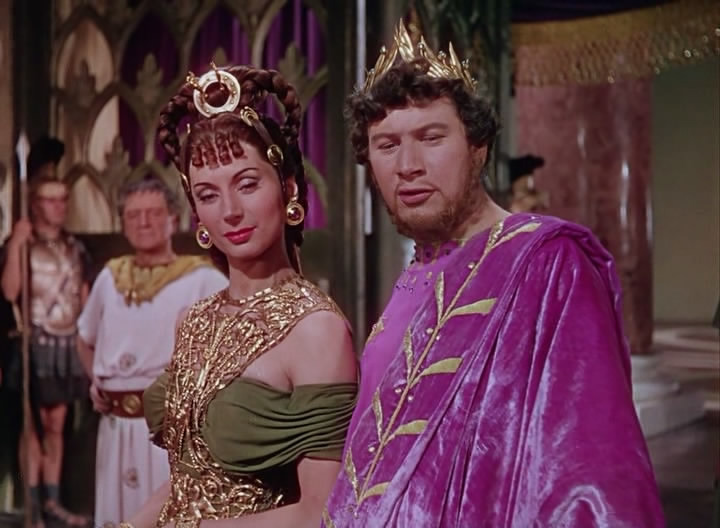
QUO VADIS (WHERE ARE YOU GOING?). (1951) DISTRIBUTED BY METRO-GOLDWYN-MAYER. BASED ON THE NOVEL BY HENRYK SIENKIWICZ. DIRECTED BY MERVYN LEROY. PRODUCED BY SAM ZIMBALIST.
NARRATED BY WALTER PIDGEON. STARRING ROBERT TAYLOR, DEBORAH KERR, LEO GENN, PATRICIA LAFFAN AND PETER USTINOV.
REVIEW BY SANDRA HARRIS. ©
‘Tigellinus, bring me my weeping vase…!’
Now, this is a Biblical epic you can really get your gnashers into, and perfect viewing for my Holy Saturday night this year. The DVD box informs me that it features ‘110 speaking parts, 30,000 participants and a filmed-on-location panoply of marching legions, magisterial pageantry and massive spectacle that includes the martyrdom of Christians thrown to the lions before cheering Coliseum throngs.’ You’d better believe it, lol.
Robert Taylor, maybe not quite as handsome or charismatic as Richard Burton in THE ROBE, another famous Biblical epic, but a perfectly acceptable leading man nonetheless, plays Marcus Vinicius, a legion commander in Rome’s powerful army.
At the time we meet him, he’s just returned to Rome after three long years spent conquering Britain and Gaul (France) and, believe me, he’s got some very unflattering things to say about the British and French women he met there, the cheeky sod!
Anyway, he returns to Rome to much fanfare and immediately falls in love- or lust!- with a beautiful young woman called Lygia. (She’s played by Deborah Kerr, who feels in this instance completely inter-changeable with Jean Simmons in THE ROBE, if you know what I mean! Stick-thin and passionate in love, with long hair and a devotion to doing the right thing, whether it comes from the religion of Christianity or not.)
Once the high-born daughter of the Lygian king, Lygia has resided in the house of the now elderly General Plautius and his wife Pomponia since Rome conquered the kingdom of Lygia and the girl was taken prisoner. The Plautius family adopted her and love her as if she were their own daughter.
Now she’s all grown-up and a committed Christian, or follower of Jesus Christ, the carpenter from Nazareth, born in Bethlehem, who was crucified by the Romans some thirty years before. The followers of Jesus believe that it’s a sin to kill, to rape, murder or pillage, and to keep any man, however lowly-born, in chains and bondage.
None of this sits well with the beliefs of Rome and her legions of armies. When Marcus Vinicius first sees Lygia, he can’t understand why she’s not keen to be clubbed on the noggin, dragged off to his cave by her hair and raped repeatedly, which is what his initial attempts at ‘wooing’ amount to.
He gets angry at her obvious reticence and goes over her adoptive father’s head to the Emperor Nero, who kindly consents to give Marcus ‘ownership’ of the ‘slave’ girl, Lygia. After Nero establishes, mind you, (with the help of Petronius, his yes-man, who actually tells him what to think, the dope!) that she’s ‘too narrow in the hips’ to be of interest to his royal self…!
Nero, played wonderfully by a very young Peter Ustinov in one of his career highlights, is every bit as capricious and wicked an emperor as Jay Robinson’s magnificent Caligula in ‘THE ROBE’ and ‘DEMETRIUS AND THE GLADIATORS.’ He plays Nero like a spoilt, emotionally disturbed child who’s pleasant enough when he’s getting his own way but who can be very, very dangerous when crossed.
When we first meet Nero, he has just had his wife and mother brutally murdered and replaced the former with another, the conniving, hard-faced Poppaea. She’s a striking-looking woman with the most fabulous wardrobe and a terrific line in hair accessories and jewellery.
It is Poppaea’s job to come up with ever more sick and twisted entertainments for her husband, to keep him from the boredom that’s always threatening and that can be perilous indeed for his minions.
She delights in this mission and it seems she’s well suited to her spoilt brat of a husband, who resembles nothing so much as a nasty fat little bully of a schoolboy who’d be quite happy to pull the wings off the birds of the sky if they declined to sing for him. And speaking of singing…!
‘Oh, lambent flames…!’ Nero is under the fond illusion that he is a master at song composition and poetry. It’s the job of his toady, Petronius, who also happens to be Marcus Vicinius’s uncle, to tell Nero he’s the best thing to hit the open mic scene since Ed Sheeran.
Petronius inwardly loathes Nero and has nothing but contempt for him and his stupid musical compositions, but sometimes you gotta kiss up to the king if you want to keep your head. That’s certainly what it’s like under Nero in the corrupt and sleazy Rome of the day.
Nero, who infamously was said to have fiddled while Rome burned, is not a fitting, worthy ruler of the empire that brought so much progress, knowledge, learning and improvements to the world.
A worthy ruler would have tempered justice with mercy and freed the thousands of slaves and allowed them to go back to their homes. He also wouldn’t have considered whipping, torture and execution the correct way to get more work and loyalty from these slaves. That kind of enlightened rulership was still quite a long way off.
There are some highly dramatic but terrifying scenes in the movie, which is rated PG, but I’m not sure little kiddies would be okay with the scenes of Rome burning and her inhabitants panicking while fleeing their deadly collapsing city.
There are also the dreadful scenes of the crucifixion of an elderly man who’s never harmed anyone in his life, and of dozens of innocent Christians, wrongly blamed for Nero’s deliberate arson of their city, being fed to the lions who, by the way, are very, very real lions and are not holograms or computerised in any way…!
You could actually compare Nero to Hitler in a couple of quite significant ways. Both men held the Wagnerian fantasy of the world ending in a flame-licked Armageddon close to their hearts, or to the places where these organs should have been, anyway. Both men wanted to create new, bigger and better cities from the ashes of their ruined ones.
Nero wanted his new city- Neropolis, if you please- to rise like a phoenix after he’d burned the original Rome to the ground. Such wanton death and destruction truly beggars belief. Hitler wanted his metropolis- Hitlerland, no doubt- to arise out of the ruins left behind in his country after World War Two had ravaged it. Neither of them were too bothered either about the lives and homes that had to be destroyed utterly first before their precious new cities could be born.
Both men pored for hours over scale-models of their new cities. When the Second World War was nearing its end and Hitler was trapped in the bunker with his minions, he retired from reality altogether and just spent his days playing with his models of a new city that would never be built, because the man who’d dreamed it up would be dead, in disgrace for all eternity.
And the way that Nero scapegoats the Christians for the arson he committed, does that remind you of anything else? Hitler’s scapegoating of the Jews for everything that was wrong with Germany, from the Versailles treaty to mass inflation and unemployment, maybe?
They could almost be twins, Nero and Hitler. Hitler had artistic pretensions too, don’t forget. Thought he could paint, just like Nero fondly imagined he could sing and compose songs and poetry to rival anything the gods themselves could come up with. Just wait until Nero reads Petronius’s parting jibes…! Methinks a rude awakening is on the cards.
So, let’s leave these two nutcases behind and briefly return to Marcus Vinicius and the lovely Lygia. How can they find love and happiness together when Lygia believes deeply in the teachings of Christ and Marcus is a firm non-believer and a sexual harassment lawsuit waiting to happen to boot?
Lygia admits she’s attracted to him, despite his caveman ways, and could easily love him if only he’d keep an open mind on the subject of Jesus. Can Marcus overcome his jealousy of the carpenter dude he’s never met and accept Lygia’s overwhelming love for Christ and his precepts? Or is it all doomed to end in tears on the sandy floors of the Coliseum? You’ll have to watch this cracking Biblical epic to find out, readers. Happy Easter to one and all.
‘O Lambent Flames’ is Number One on iTunes and Spotify this Easter Sunday.
AUTHOR BIOGRAPHY OF SANDRA HARRIS.
Sandra Harris is a Dublin-based novelist, poet, short story writer and film and book blogger. She has studied Creative Writing and Film-Making. She has published a number of e-books on the following topics: horror film reviews, multi-genre film reviews, womens’ fiction, erotic fiction, erotic horror fiction and erotic poetry. Several new books are currently in the pipeline. You can browse or buy any of Sandra’s books by following the link below straight to her Amazon Author Page:
http://www.amazon.com/-/e/B015GDE5RO
You can contact Sandra at:
https://www.facebook.com/SandraHarrisPureFilthPoetry
https://sandrafirstruleoffilmclubharris.wordpress.com
http://sexysandieblog.wordpress.com
http://serenaharker.wordpress.com
https://twitter.com/SandraAuthor

